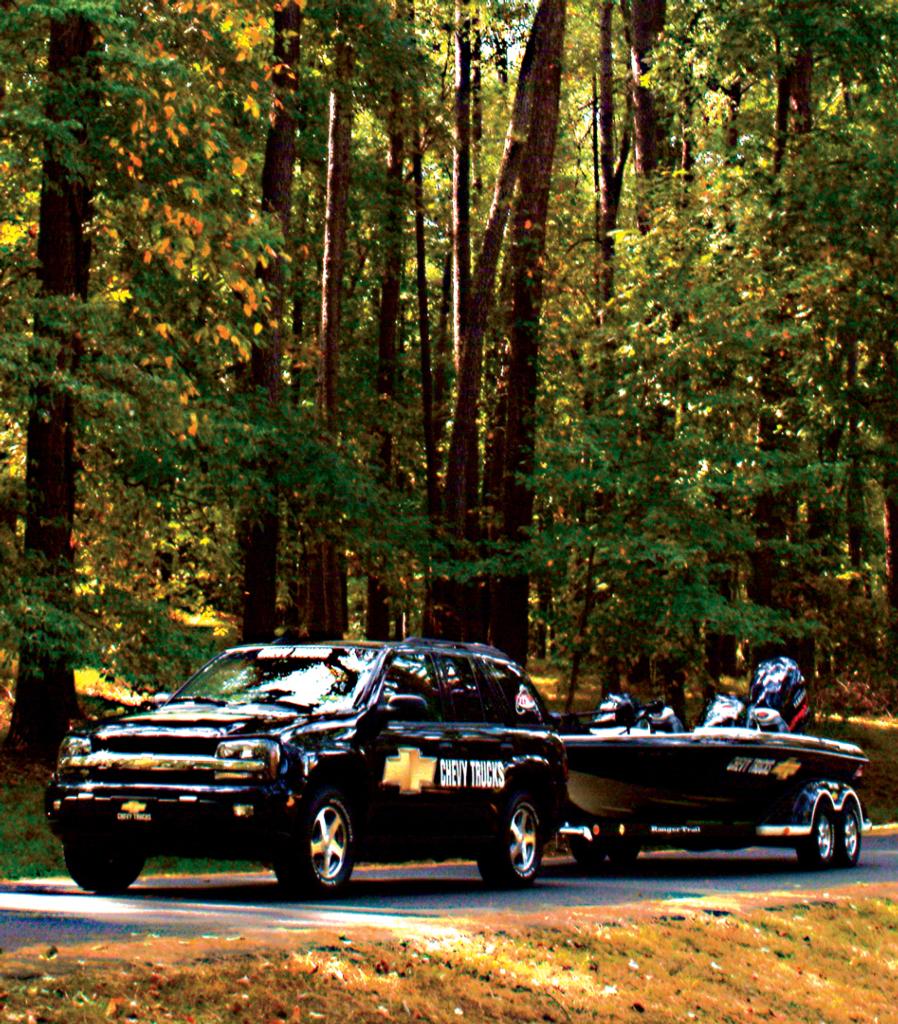Tips for better towing
Routine trailer maintenance may reduce the pain at the fuel pump

————————————–
Editor’s note: This article originally appeared in the May-June 2006 issue of FLW Outdoors Magazine. Learn more about FLW Outdoors Magazine and how to subscribe by clicking here.
————————————–
With gas prices being what they are, a $20 bill won’t get you nearly as far down the road as it used to. Not surprisingly, just about everybody is looking for good ways to get more distance for their buck.
Some folks are coping with steep gas prices by going less and staying put more. But anglers don’t fit that mold. Most of the serious anglers I know had rather burn their lure allowance in the fuel tank than sacrifice precious time spent on their favorite playground.
There are other ways the angling crowd can deal with expensive fuel prices without surrendering precious fishing time. Making sure your tow vehicle is tuned properly is one. Routine trailer maintenance is another, and possibly one of the most overlooked. Fiberglass fishing machines are heavier than you may think. A fully rigged and loaded bass boat and trailer will easily top 2 tons. Strap that much weight to the hitch of a 1/2-ton pickup and those ponies are sure to strain a little. The fuel gauge will fall faster too.
Fuel mileage will vary from one tow vehicle to the next, but declines of 20 to 30 percent aren’t uncommon with a heavyweight boat tracking behind. The losses can be even more drastic if something is restricting the trailer from rolling smoothly down the road. Several things can influence how much lug a boat/trailer package puts on ol’ Bessie. Does the trailer sit level? Is it balanced properly? Are the trailer tires inflated to the recommended PSI? Perform a quick inspection next time you hookup to go fishing. If the answer to any of the aforementioned questions is no, you could be burning more dollars at the pump than you should be.
Following is a list of trailer maintenance tips to help bolster tow-vehicle fuel economy:
Tires: Trailer tires low on air pressure won’t roll or track as easily. This means the tow vehicle has to work harder to pull the rig, thus reducing fuel economy. Tires short on air tend to heat up much faster due to friction. Low air pressure also can cause the tire rubber to flex more than it should. Both can lead to premature wear and/or hazardous blowouts. The same can occur when trailer tires are over-inflated. This can promote excessive wear in the center of the tire or “crowning,” according to Tim Boatman, a tire dealer based in Nacogdoches, Texas. Boatman said it is usually a good idea to keep boat trailer tires inflated close to their suggested maximum cold air pressure.
The suggested pounds-per-square-inch (PSI) number will be listed on the sidewall of the tire. “Maintaining the proper air pressure on trailer tires for the load you are carrying can have a big impact on fuel economy,” Boatman said. “It also helps extend the life of the tire and reduce the odds of blowouts during towing.”
Level ride: The more level the trailer rides, the easier it is for the tow vehicle to pull it down the road. In contrast, a trailer that noses upward will cause wind to catch beneath the boat. This causes wind resistance, sort of like a parachute, though not as radical. It is fairly easy to remedy the problem by sliding a “drop hitch” into the square receiver hitch, which bolts to the frame beneath the bumper. A drop hitch has an offset arm to which the trailer ball is attached. Offsets are available in several sizes, ranging from 2 to 9 inches. This allows for precision adjustment, even on a high-heeled four-wheel-drive vehicle.
Tongue weight: It is possible to have too much or not enough. Ideally, the amount of weight that is distributed on the tongue of the trailer should be about 5 to 10 percent of the total tow package, including the boat, motor, gear and trailer. A boat that rides too far forward on the trailer can cause excessive weight on the tongue. The weight naturally shifts to the bumper, which increases the work load on the vehicle. A back-heavy trailer can be a recipe for disaster. Too much weight toward the rear of the trailer can actually make the tongue want to rise off the ball. The reduced weight on the bumper of the tow vehicle also can cause the trailer to sway or “fish tail” at high speeds.
Load capacity: Every vehicle has a limit on how much weight it can pull safely. It is called “towing capacity.” Exceeding a vehicle’s towing capacity is sure to crimp fuel economy. It also causes a safety hazard because it hinders braking ability.
Cover up: Seats, consoles and windshields catch a good bit of wind when a boat is rolling down the road at 70 mph. You can eliminate the drag by covering the boat, especially on long trips. If you don’t own a cover, fold down any elevated seats or remove them until you arrive at your destination.
Wheels and brakes: It takes a pretty good blow to do damage, but trailer axles and spindles do get bent on occasion. This can cause tires to wobble and wear unevenly. In severe cases, a bent axle could cause the trailer to track crooked behind the tow vehicle. The remedy? That depends on the extent of the damage. But repairs are definitely in order. Electric braking systems also need occasional attention to ensure everything is functioning properly. If the system is equipped with a coupler tab, make sure the tab is released each time you hook to the boat. Otherwise, the brakes could remain partially engaged. This will cause undesirable drag on a tow vehicle and premature wear on the brakes.